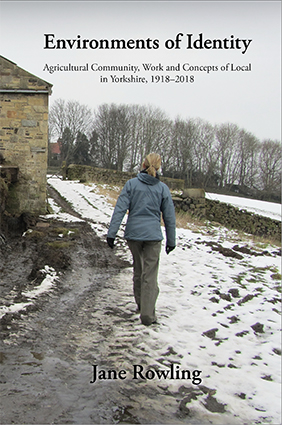Environments of Identity
Agricultural Community, Work and Concepts of Local in Yorkshire, 1918–2018

Jane Rowling
The UK countryside is under pressure. The needs of food production compete with those of the environment, heritage and leisure, and this pressure is increasing as ever more space is allocated to development and for carbon capture and conservation projects. The history of how rural space has been managed has been tackled by both environmental and agricultural historians. For the first time, this book brings together these two subdisciplines to build a detailed portrait of the symbiotic relationship between land managers and the British farmed landscape from the end of the First World War to the twenty-first century.
Taking the idyllic Yorkshire landscape of Lower Wharfedale as the main character, this is a story of farming through a century of change. Based on detailed oral history interviews with local farmers who began their careers in the early part of study period, and their grandchildren and counterparts who are linked to the same farms in the twenty-first century, this book explores the impact of the farming community on the farmed environment while also highlighting the agency of the environment in forming farming identities. This study not only illuminates the way in which the land has been managed in the past, but also draws out the stories of farmers’ relationships with their land over generations. Understanding how these relationships function, in the context of their agricultural and environmental histories, will be crucial for the successful implementation of the landscape level change in practices and approaches that will be essential to mitigate climate change.
THE AUTHOR
This book has grown out of Jane’s Ph.D. research into the history of the farming community in Lower Wharfedale in the twentieth century. Following the completion of her Ph.D. in 2017, Jane worked for water@leeds at the University of Leeds. Between 2018 and 2021, she researched past and present water level management from 1750 to the present day as Research Associate on the Past Flooding Matters project, based at the University of Hull. Her work focuses on the relationships of farmers with their environment, and how competing ideals of environment impact on both land management approaches and the ways in which farming people view themselves. Her publications have explored the themes of trust, community, land management, women’s work on the farm, and the relationships between farmers, farmworkers, and other bodies which have interests in managing the countryside. Jane is now managing the development of the Farm and Rural Liaison project with Calder and Colne Rivers Trust, and is a BASIS qualified soil and water management advisor.
‘… a model of how to approach a microhistory of one locality … deserves a wide audience and a place on the reading lists of many disciplines.’
NICOLA VERDON, Family & Community History
‘Rowling should be commended for the innovative approach and originality, which offers a distinctive lens for understanding farming communities.’
SARAH HOLLAND, Agricultural History Review
I found it interesting, informative, and enjoyable in equal measure and would have no hesitation in recommending it if you have an interest in rural life and identity.
IAN PARKER HEATH, H-Environment
CONTENTS
Introduction
Historiography
Why Oral History?
Bridging the Gap: Agricultural and environmental histories in Lower Wharfedale
Lower Wharfedale
Childhood Environments
Rural Childhood: Historiography
Open and Closed Space: Risky play in the farmed environment
Multiplex Space: The users of marginal spaces within the farmed environment
Girls, Negotiating the Landscape, and Independent Travel
Risky Play: The consequences
Dangerous Environments
Adult Decision-Making and Risk-Taking
The Mentor-Mentee Relationship and Personal Identities
Disasters and Risk Management
‘Clean’ Farming and the ‘Chemical Generation’
Dealing with Dangers: Technology and Policy
Working Environments
Managing the Environment through Technology
The Masculine and the Rural in the First Half of the Twentieth Century
Sex Roles and the Environment
Men, Working Identity and Environmental Violence in the Early-Mid Twentieth Century
Women and Feminine Gender Roles at Work in the Farmed Environment
Environment as the ‘Display Case’ of Farming Skill
Technology, Identity and the Farmed Environment: Horsemen
Technology, Identity and the Farmed Environment: Tractormen
Whose Environment? Lower Wharfedale’s Red Kites: A case study
Challenging Environments
Old Age: Historiography
Old Age, Farm Work Roles, and the Reversal of the Mentor-Mentee Relationship
A Crisis in Slow Motion: The lonely farm
Changing Technology, Changing Community
The Meaning of ‘Local’ The Ageing Farmed Environment
Conclusion
ISBN 978-1-912186-52-5 (HB), Published 1st July 2022
DOI: https://doi.org/10.3197/63792041027067
300 pp.; £65
